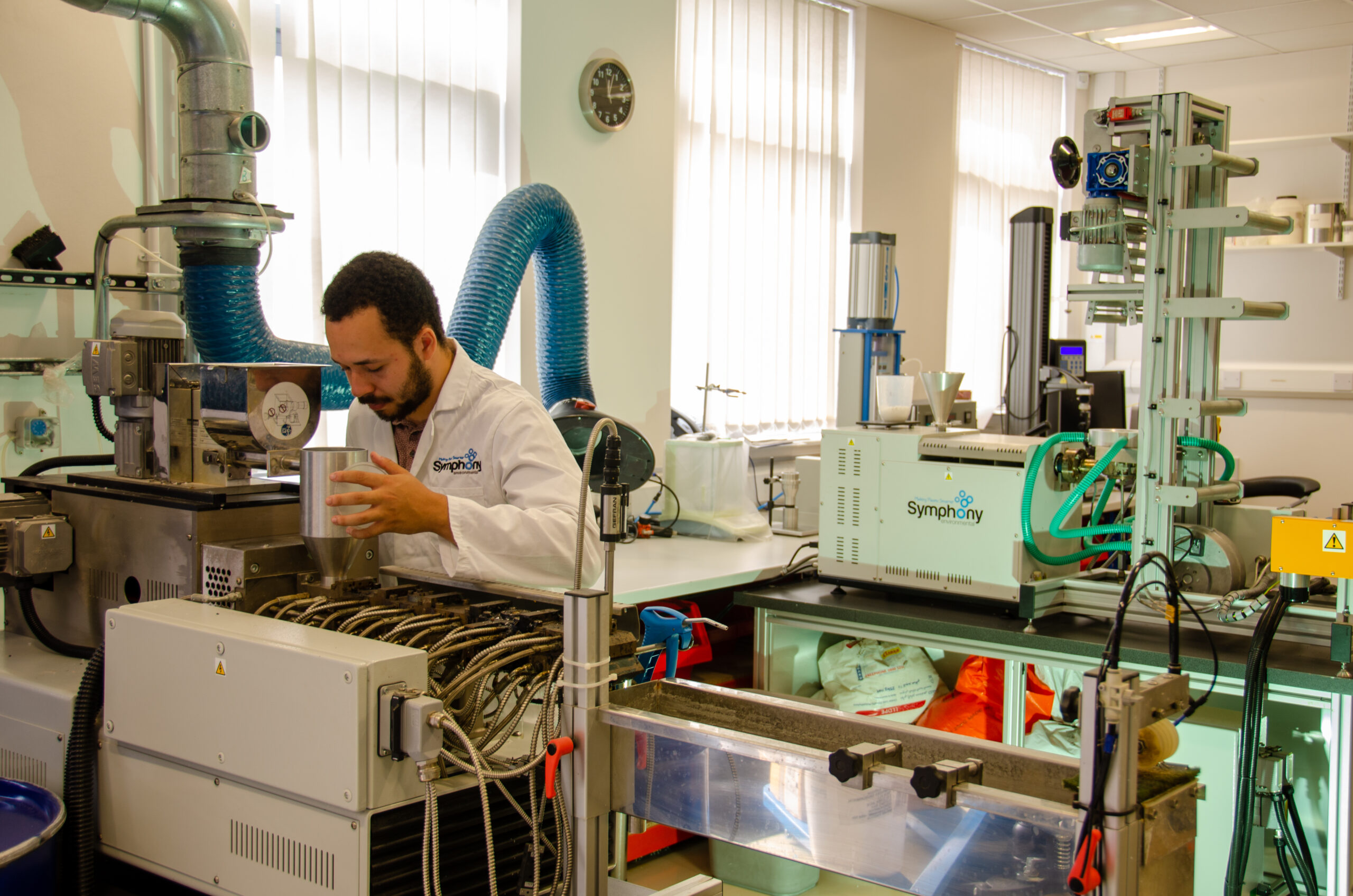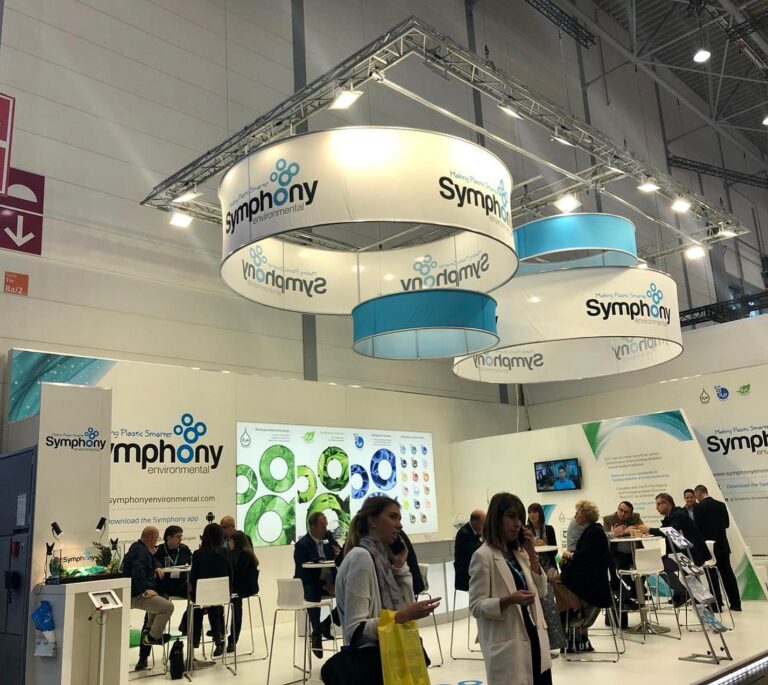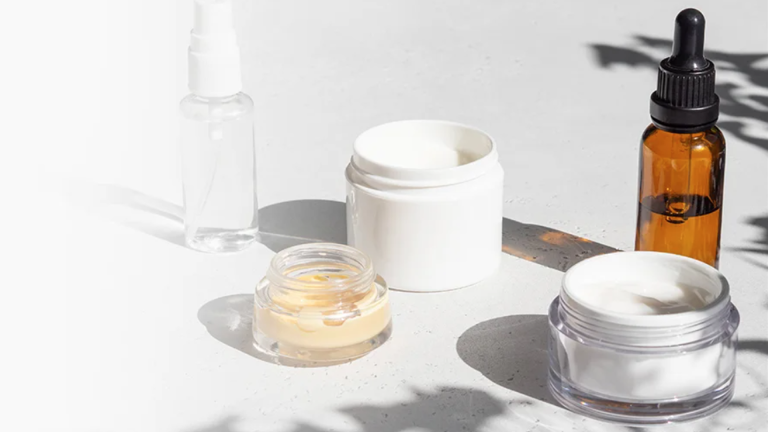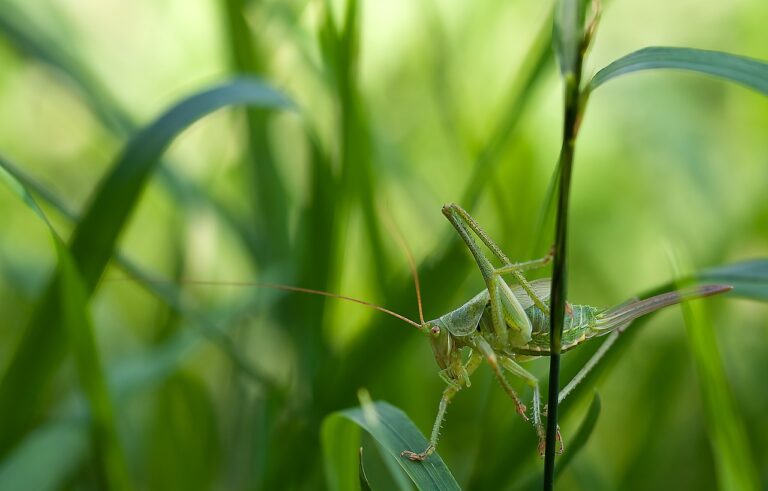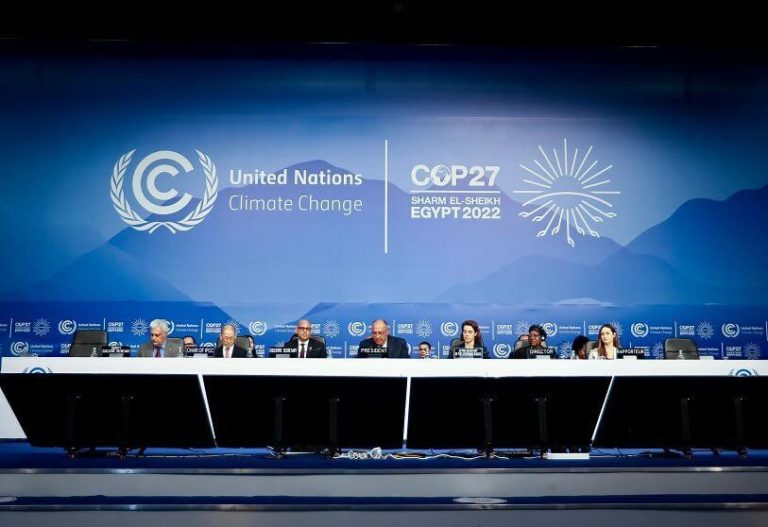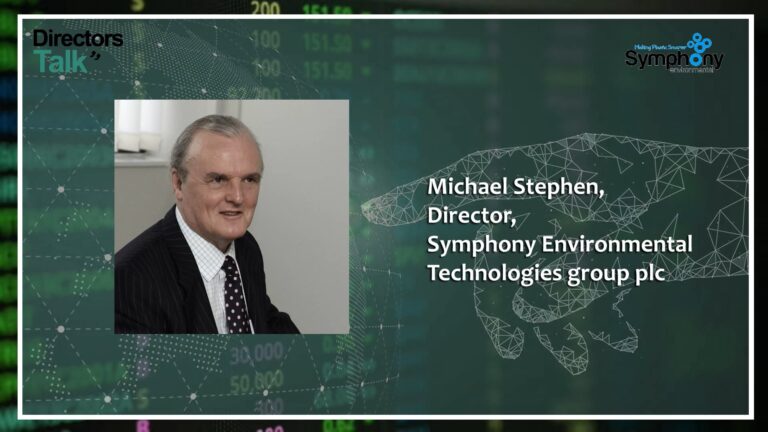Symphony Environmental Technologies Plc (LON:SYM), a global specialist that makes plastic and rubber products smarter, safer and sustainable, has announced its interim financial results for the six-month period ended 30 June 2022.
Financial highlights
· Group revenue of £3.0 million (H1-2021: £4.9 million) softer than prior year due to short term logistics, regulatory and resource issues, which have since resolved, and timing on the delivery of key contracts, temporary destocking issues and a change to our glove strategy
· d2p revenue increased c.200% to £0.3 million (H1-2021: £0.1 million) with continued conversion of higher value d2p anti-insect (“AI”) opportunities
· Gross profit of £1.1 million (H1-2021: £1.9 million)
· Loss before tax of £1.4 million (H1-2021: £0.6 million)
· Basic loss per share of 0.73 pence (H1-2021: 0.29 pence)
· Cash used in operations £0.8 million (H1-2021: cash generated £0.3 million)
Operational highlights
d2p
· Supply Agreement with Grupo Bimbo, the western world’s largest bread producer for the Group’s FDA-approved d2p anti-microbial (“AM”) bread packaging technology
· Continued progression of our d2p pipeline commercialisation with positive test results received for d2p AM, d2p AI and d2p flame retardant (“FR”) that are expected to result in orders during Q4
· Change in glove strategy – revenues awaiting regulatory approvals
d2w
· Two-year contract with Better Earth, a US packaging company, to use d2w in nutritional supplement bottles
· d2w regulatory confirmation in Peru
· Positive regulatory progress in several key Central and South American countries
Post period-end highlights
· Significant increase in sales and activity in India due to new regulation which allows exemptions for biodegradable products
· New d2p AI orders ($340,000) with Rivulis Irrigation Ltd with further orders anticipated during Q4
· Middle East – manufacturing agreement for d2w masterbatch, with volume production expected to commence in October 2022 following successful start-up trials
· Balance sheet strengthened by £1.0 million – Sea Pearl shareholding increased to 17.4%
· New Mexican biodegradable standard applicable to d2w
· Expect to achieve a minimum annualised run-rate revenue of £14.0 million between Q4 2022 and H1 2023, through the conversion of a number of our active near-term pipeline opportunities
Michael Laurier, CEO of Symphony, commented on the results and business:
“I am very pleased to report that we expect to achieve a minimum annualised run-rate revenue of £14.0 million between Q4 2022 and H1 2023, through the conversion of a number of our active near-term pipeline opportunities.
Excellent progress has been achieved with our d2p antimicrobial technologies for use in bread and other food packaging for the North and South American markets as well as for insecticidal technologies in agricultural applications for Europe and the Middle East. As a whole, both India and the Middle East are expected to add significant revenues in the near term as we have strong partners, proven products, and market readiness after many years of investment. Beyond this, our medium to long term sales potential is therefore substantially higher than the above £14 million.
This year so far has been one of continued development to which we are seeing low-cost biodegradable technologies growing in favour globally, and there is increasing acceptance of, and commercial interest in, our d2p suite of products. We, together with our partners, are now moving into a very positive commercial phase.”
Chairman’s statement
I am pleased with the progress the Group has made in the first half of the year as we continued to lay solid foundations from which to build our commercial success. Although revenues were softer than the same period last year, we reported on 1 August 2022 that this was primarily down to various logistical, regulatory, and stocking issues which have now been rectified. Additionally, the several new contracts and other positive developments achieved during the period had not yet translated into revenues. These new contracts and developments significantly underpin many of our growth initiatives for both d2w and d2p in the near to medium term.
We were delighted to achieve a significant commercial supply agreement for d2p antimicrobial (“AM”) technology with Grupo Bimbo, the western world’s largest bread manufacturer. This agreement followed FDA and Health Canada approvals of our d2p AM bread technology. The size of the US bread market in 2018 was estimated at $20 billion (source: Global Markets Insights) and, as the only FDA-approved AM technology for this type of packaging application, we believe that we are well positioned to capture substantial market share in the medium to long term. Initiatives are also in progress with bread manufacturers in Latin America and other parts of the world. Our strategy is to capture a substantial part of these new markets that we estimate will result in annualised revenues of at least £2.5 million in the near term with strong growth over the medium to long term.
Symphony India, our joint venture company in India owned by Symphony and Indorama Corporation, received a prestigious sustainability award for our d2w biodegradable technology. As further set out in the Chief Executive’s report, new legislation in India requiring minimum thickness of certain types of plastic products unless certified by the Government as biodegradable, resulted in Symphony India achieving a significant increase in sales and marketing activity for d2w technology.
d2w revenues are also anticipated to show substantial growth in other markets in the near term because of several factors, including: the establishment of local manufacturing in the Middle East and a reset of regional stock levels; legislative enforcement in Saudi Arabia which is an ongoing process that started accelerating in recent weeks; and Latin American legislative and standards initiatives, which are expected to continue progressing in the right direction following recent positive developments in Peru and Mexico. We are also very happy with progress made outside of regulatory drivers, especially the United States where we signed a contract earlier in the year for nutritional supplement bottles.
We have shown a c.200% growth of d2p sales during the period based on our successful anti-insect (“AI”) technology for use in agricultural applications. Current dialogues indicate that this will grow and expand globally. In addition to the above, flame retardant (“FR”) and odour absorbent (“OA”) technologies are close to completion on several initiatives. This is all within our current d2p pipeline of over 60 projects. Revenues for AI are anticipated to reach £600,000 in 2022 and are expected to more than double during 2023.
Group revenues for H1-2022 of £3.0 million (H1-2021: £4.9 million) were lower primarily due to a change in protective glove strategy, moving away from commodity gloves to higher value EU certified products, with regulatory approvals currently in process, together with materially lower sales of d2w in the Middle East due to temporary destocking by our distributor and logistical issues, which I’m pleased to note most of which have now been resolved.
The near-term annualised revenue run-rate, including the initiatives described above, which we expect will be achieved between this year’s Q4 through H1 2023, exceeds £14 million. Undoubtedly the Group’s opportunities are significant and real, but the Board and I are acutely aware that these multi-year projects do not fit neatly into reporting periods. Whilst the returns on these projects will be highly profitable, the Company’s financial performance in any given reporting period is affected by the timing of these projects. This financial year is no different, and whilst the Board remain of the view that full year market expectations are achievable, if certain projects are delayed, this may impact results.
Finally, I am pleased that we have been able to strengthen the Board during the period, with the appointment of The Hon. Alexander Brennan, and look forward to the coming months with growing confidence.
Chief Executive’s review
The financially slow period during the first half of the year does not reflect the significant underlying progress being made across the business on several fronts. We now have a very strong joint venture partner in India and a highly motivated and growing team, building an increasing network of strong, high quality and well-connected hub-distributors, with demand being further driven by positive regulatory change. In addition to this, the Middle East is also showing great promise as plastic regulations and compliance are gaining traction, and there is growing interest in customer-evaluation trials for our other d2p technologies.
Financial
Revenue for the 6 months ended 30 June 2022 was £3.0 million (H1-2021: £4.9 million).
The H1-2022 revenue performance was softer than normal, affected by short-term logistical and resource issues, slow and complex d2p regulatory approvals, temporary d2w destocking at our Middle East distributor, and a change to our glove strategy. The short-term logistical and resource issues are resolving as anticipated, and we are seeing restocking at our Middle East distributor.
As previously advised, having focused our glove strategy on higher value EU certified gloves and moving away from commodity gloves, near-term revenues were negatively affected by c.£1.0 million during the period. We are awaiting regulatory approvals for our gloves, which is anticipated later this year. Once regulatory approvals are received, we will recommence the sales and marketing initiative. Based on feedback from the market through our potential customers, we anticipate there will be high demand for these certified gloves and will benefit from greater protection from competitors, as the regulatory process is time-consuming, costly, and complex, creating a strong barrier to entry.
Gross margins also softened during the period due to high raw material and shipping costs which have recently been reduced closer to historical levels. In particular, distribution costs due to global vessel and container shortages, are now easing, with c.20% reductions since the peak during the first half of the year. These are expected to continue falling throughout the rest of 2022.
As previously advised, we continue to incur costs in relation to supporting d2w advocacy communications in the UK, Middle East and Latin American markets. In addition, regulatory and other IP related costs continued for new d2p products for the EU and US markets.
The Company continues to invest in its sales and other operating functions to better manage its strong and growing pipeline and also in its quality control systems and service-levels as these form the basis of our brand value.
The Group’s share of Symphony India’s joint venture start-up loss for the period was £23,000 (H1-2021: £nil). The Group’s 46.5% interest in the Indian company is recognised as a joint venture investment in our financial statements using the equity method.
This additional strategic investment in key resources, together with the above-described factors resulted in a net loss before tax of £1.4 million (H1-2021: £0.6 million).
An R&D tax credit of £119,000 was received during the period (H1-2021: £127,000). The Group reports a loss after tax of £1.3 million (H1-2021: £0.5 million).
The loss per share for the period was 0.73 pence (H1-2021: 0.29 pence).
Post period-end we were also pleased to see our balance sheet strengthened following a £1.0 million equity fundraise from Sea Pearl Ventures Limited, increasing their shareholding to 17.4% and demonstrating their ongoing support and optimism around the potential of the Group.
d2p “designed-to-protect”
d2p revenues for the period were up c.200% to £345,000 compared to £111,000 for the same period last year due primarily to d2p AI growth. Since the period-end Rivulis placed a record order of $340,000 for new d2p AI product which was shipped in Q3 2022. There were several positive laboratory and field test results for d2p AM, d2p FR and d2p AI initiatives in several of our markets, which we believe, following discussions with our distributors and potential customers, will lead to a number of material new orders during the second half of 2022 and into 2023. This is all within our current d2p pipeline of over 60 projects.
Most significant is the d2p AM bread technology where we expect the sales process with Grupo Bimbo to start in Q4 of this year. Initiatives are also being undertaken in Latin America and other parts of the world.
d2w biodegradable technology
Post period-end we signed a manufacturing agreement with Ecobatch Plastic Factory in the UAE, for the production and supply of d2w into the Middle East. The manufacturing facility is expected to start operations in October. This facility, being financed and operated by our local partners, will reduce reliance on expensive and unreliable freight from our Far East facility, where most of our products for supply to this region are currently made. In preparation for the switch from imports to locally made products in the Middle East, stocks and orders were temporarily reduced in the period – which had a short-term but material negative effect on H1 performance. These sales have not been lost, but delayed to H2-2022. We anticipate improved sales and sales and supply efficiency, as well as improved Group cashflow and operating margins, following the switch to this facility.
We continue with advocacy in Latin America, UK, and the EU. The regulatory clarification in Peru, resulting in a clear distinction being officially acknowledged between oxo-degradable and oxo-biodegradable, will help generate revenues in the region. Further, the Mexican Ministry for the Economy published a new Mexican Technical Standard with positive commercial implications for d2w, acknowledging and validating the technology for the accelerated biodegradation of plastic. We anticipate further positive news from other Latin American markets during Q4 2022.
We are confident that many of our markets will produce significant growth as the environmental drive for better alternatives to non-biodegradable plastics has become an increasingly urgent issue for Governments and brand-owners to resolve.
India
As announced in November 2021, Symphony became a 46.5% joint venture shareholder in Symphony India, with Indorama Corporation holding 46.5% and the MD, Arjun Aggarwal holding 7%.
Symphony India received a prestigious sustainability award for our d2w biodegradable technology during the period and sales traction is gaining rapid momentum. The increase in sales is being driven by the Plastic Waste Management Rules 2022 (as amended 6.7.22) which permits government-approved biodegradable plastic products to be exempted from restrictions that would ban most plastic film products unless they are above 50-micron thickness, and 120 microns for carrier bags, (which generally means an increase in cost by more than two to three times). Producers and brand owners using certified biodegradable plastic materials will be free from this obligation, thus providing Symphony’s d2w technology with a competitive advantage in a country with a population of c.1.4 billion.
Based on current enquiry and order activity, sales of d2w by Symphony India are expected to increase to levels of over £250,000 per month from early 2023.
EU Action
As previously announced, Symphony commenced a legal action against the Commission, Parliament and Council of the EU having been advised by three specialists in EU law that Article 5 of the Directive 2020/904 is unconstitutional. We are currently waiting for the court to fix a date for an oral hearing in Luxembourg. This is expected in Q4 2022 or Q1 2023.
The Defences did not reveal anything unexpected, and Symphony’s legal team remain confident that the EU acted unlawfully in imposing a ban on a material which they call “oxo-degradable plastic” in Article 5 of the Directive. In any event, Symphony does not accept that the ban applies to oxo-biodegradable plastics, which are made by incorporating Symphony’s d2w masterbatch into ordinary plastic, and do not have any of the undesirable characteristics listed in Recital 15 of the Directive.
Confidence that our product is not included in the ban has been reinforced by new legal Advice from Josh Holmes KC a leading Barrister at London’s Monckton Chambers, who specialises in EU law.
Eranova
As announced in October 2020, The Group entered into an exclusive distribution agreement and made an investment representing 1.6% of the enlarged capital of Eranova SAS (£123,000 including costs) as part of a €6 million pre-industrial plant project. The pilot plant was completed on schedule during October 2021 and is operational and processing small-volume commercial orders. We expect further positive developments during 2022.
Balance sheet and cashflow
The Group had net borrowings of £0.7 million at the end of the period (30 June 2021: net cash of £0.7 million). Net cash of £0.8 million was used in operations (H1-2021: generated in operations £0.3 million).
The Group has an invoice discounting facility of £1.5 million to assist in funding outstanding receivables. Since the period end £1.0 million of new equity was issued, further strengthening the Group’s balance sheet. The Board believes that the Group has sufficient working capital to support the business and its current opportunities going forward.
The increasing strength of the US dollar as against the UK pound is beneficial for the Group, as we generate most of our revenues in US dollars.
Outlook
After many years of R&D and product development, commercialisation of some key product lines is now expected in the very near term with substantial sales growth anticipated. Further, we are encouraged by the level of positive trials and sales activity in many areas of the business worldwide, covering a wide range of different product applications and technologies.
We expect to achieve a minimum annualised run-rate revenue of £14.0 million between Q4 2022 and H1 2023, through the conversion of a number of our active near term active pipeline opportunities, and is made up as follows, compared to FY 2021:
| Initiative | 2021 revenue | Near term annualised expected revenue |
| d2w biodegradable (excluding India) | £7.2m | £9.0m |
| d2p AM bread technology | – | £2.5m |
| d2p AI technology | £0.1m | £1.0m |
| d2p general pipeline | £0.2m | £1.0m |
| d2p gloves | £1.0m | £0.5m |
It should be noted that the above necessarily excludes d2w projects in Symphony India. This is because of Symphony’s ownership of 46.5% means that from an accounting perspective, we cannot consolidate Symphony India revenues into the Group results – we are instead required to equity account for Symphony India which means we can only recognise our share of the profits made by Symphony India in our Group consolidated accounts. Accordingly, it would be misleading to present Symphony India revenue opportunities above, but as further set out in the India Operations Update, released at 7:01am on 29 September 2022, these are considerable.
Our medium to long term sales pipeline is substantially higher than our near-term annualised sales pipeline of £14 million. To meet this financial year’s market expectations, the Group is relying on timing of the key areas as described. Whilst the Board remain of the view that full year market expectations are achievable, there is, for the above reasons, risks outside of management’s control, in these numbers.
Our opportunities are real and significant, and we look forward with growing confidence.
Michael Laurier, Symphony Environmental Chief Executive


